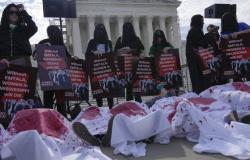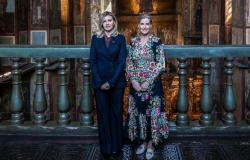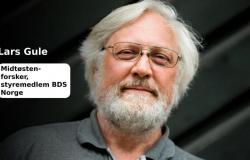Ukraine is no longer on the offensive.
- Georg E. Riekeles
Assistant director at the Brussels-based think tank European Policy Center (EPC).
Less than 20 minutes ago
E24’s regular columnists write regularly and express their own attitudes.
The words in the heading are Churchill’s from his speech in the British House of Commons, on 10 March 1936.
A few days earlier, on March 7, Hitler had sent 20,000 soldiers into the Rhineland, the area on the border with the Netherlands, Belgium and France which, according to the Treaty of Versailles, was to remain demilitarized.
As he had done for many years already, Churchill warned the pacifists, isolationists and petty stragglers of the time about the coming storm.
Troops to Ukraine
At the end of February, French President Emmanuel Macron surprised many when, in the press conference after an international meeting on Ukraine in Paris, he did not rule out the possibility of sending, if necessary, French and Western soldiers to support Ukraine’s resistance against Russian supremacy.
Strong reactions were not long in coming, and not just from the warlords in the Kremlin. Several Western leaders, from Stockholm to Berlin, Warsaw and Washington, were quick to say that it was definitely out of the question. Even the Pope in the Vatican has called, in unfortunate terms, for peace talks and reconciliation.
When conversations that have until then been held in closed rooms are released into the public, it is no wonder that there is an uproar. But Macron has since stood his ground: Ukraine is not about to win the war. Europe must equip itself. And the West must play on «strategic ambiguity strategic ambiguityAn expression which means that a government consciously wants to appear ambiguous in its foreign policy, for example to make the other party wonder whether it wants to enter into a conflict.» whether Russia’s aggression is to be tamed.
In Brussels, French diplomats and defense envoys have been crystal clear these weeks: “We will not do irresponsible things. But this is what we mean.»
The change in France’s strategic attitude towards Russia and the war is remarkable. In part, it is a response to the frustration and criticism that has built up over the West’s and Europe’s (and France’s) puzzling and indirect arms support to Ukraine so far.
From now on, the realities and dynamics of war must set the agenda, not one’s own wishful thinking. In Macron’s own words: “Many of the people who say ‘never, never’ today were the same people who said ‘never, never tanks, never, never planes, never, never long-range missiles, never this and never that’ two years ago.”
From reconquest to defensive war
Ukraine is no longer on the offensive – on the contrary. Since the summer, the war has gone from being a valiant attempt to reconquer the fifth of Ukraine that Russia occupies, to an urgent question of whether Ukraine can defend the four fifths that are still free.
When Avdiivka fell to the Russians on 17 February, the outlook darkened further. Not only because the city was strategically important and well fortified, but also because it became clear to everyone that behind the 1000 km long front, Ukraine lacks solid second and third lines of defense.
Ukrainian offensives never managed to break through the Russian front in 2023 precisely because it consists of several rows of minefields, tank trenches, dragon’s teeth, trenches and artillery positions. Now that Russia is on the offensive, this is something Ukraine itself lacks.
In addition, Ukraine is materially inferior. Before the summer, Ukraine fired close to 7,000 grenades a day, against Russia’s 5,000. Now Ukraine barely has supplies for 2,000, while Russia fires 10,000 a day.
The need for war material is precarious. A Czech emergency initiative has managed to obtain 800,000 artillery shells that can be delivered to Ukraine during the spring. At the same time, German and American “vetos” to more – and more advanced – arms support will hurt.
In Brussels, as in Kiev, there are more and more people who doubt that Biden’s arms package of 60 billion dollars will one day arrive. The wind has turned since the early days when transatlantic support and unity were impeccable. «Not a penny more» says Trump, and a majority of Republicans apparently think the same.
Europe’s wartime economy
It is not just the United States that is worrying. Europe’s willingness to defend itself and arms support have so far also failed. To be fair, the EU agreed on a 50 billion euro package for Ukraine on February 1, but tardiness and repeated reservations, especially from Germany on more advanced support and weapons systems, are disappointing.
One of the things the Ukrainian military wants most is German Taurus– missiles. France and Great Britain have long since sent theirs Scalp and Storm Shadows to Ukraine. Germany refuses because these cruise missiles will also be able to reach targets as far away as Moscow. France and Britain solve it by presence and control over how they are used, but it is a discussion Germany’s government is unwilling to enter into Bundestag BundestagThe German National Assembly.
At the same time, the debate is now about so much more: Europe must, simply put, equip itself to face Russia’s war economy. On 5 March, the European Commission therefore presented the EU’s first large-scale defense industrial strategy and program (EDIS/EDIP).
EDIP joins the series of new defense initiatives from the EU in recent years, such as the European Defense Fund (EDF) of 8 billion euros from 2017, the European Peace Facility (EPF) from 2021 with a framework of 17 billion euros now, and the ammunition program ASAP of 500 million euros from 2023.
Currently, only 1.5 billion euros have been set aside in the EU’s budget for EDIP in the period 2025-2027. Naturally, there is far too little to build European defense projects of common interest and importance. The goal expressed by the EU’s internal market commissioner, Thierry Breton, is 100 billion euros over the next program period.
Distress teaches a naked woman to spin, they said in the old days. The EU coffers are now empty, and therefore they are now looking at the possibility of both using the returns from frozen Russian funds and eventually issuing ‘EU defense bonds’. What was unthinkable a few years ago is no longer so.
The terrible words “too late”
At the same time that Europe is preparing to take on greater responsibility for Ukraine and in NATO, the EU will undoubtedly play an increasingly large role in the coordination and financing of Europe’s rearmament.
Norwegian defense companies, including Nammo at Raufoss, are among those already receiving large amounts of EU support, a total of close to NOK 1 billion, to increase their production of ammunition and weapons for Ukraine’s defense struggle. With the perhaps also the deep Norwegian opposition to a stronger EU on the defense front, which complements and plays on a team with NATO, will eventually be erased.
The seriousness has dawned on many. Europe is entering a time of destiny on many fronts. Over the New Year, when I asked someone on the top floor of the Commission what they were reading at the moment, I was directed to British professor Justin Bronk’s military analysis of the growing danger of even more serious conflict in the coming years.
In a RUSI memo from December last year, he describes a time window towards 2030 where the US no longer has military supremacy in the Indo-Pacific. If the US were to be drawn into a conflict by China, there is also a strategic window for a larger Russian attack or hybrid conflict in Europe.
Even without a Trump in power, Europe must urgently prepare to deter Russia without large-scale American support.
«We live in contact with the unknown, but we are not defenseless now,” Churchill concluded in his 1936 speech. “Will we take the time to make this necessary effort, or will posterity write these terrible words ‘too late’?”»
These are E24’s regular columnists
All the columns can be read here.
-
Sophia Adampour
Sophia Adampour is the founder of the technology hub Verse. Writes primarily about technology.
-
Ine Marie Eriksen Søreide
Leader of the Storting’s Foreign Affairs and Defense Committee (Right). Former Minister of Defense and Minister of Foreign Affairs.
-
Carine Smith Ihenacho
Director of ownership and compliance, Norges Bank Investment Management, popularly called the Oil Fund.
-
Espen Barth Eide
Minister of Foreign Affairs (Ap). Former climate and environment minister.
-
Asle Toje
Foreign policy commentator and researcher.
-
Mathias Fischer
General manager of Initiative Vest. Former journalist and politician.
-
Lina Strandvåg Nagell
Head of Projects and EU Policy at Bellona’s Brussels office. Writing the column From Brussels about what is happening in the Union.
-
George Riekeles
Assistant director at the Brussels-based think tank European Policy Center (EPC). Before this, he was, among other things, diplomatic adviser to the EU’s chief negotiator during Brexit. Writes the From Brussels column about what is happening in the union.
-
Johan Andresen
Chairman and investor in the Ferd group, with an additional commitment to social entrepreneurship.
-
Bettina Banoun
Lawyer, doctor of law. and partner in Wiersholm. Also a member of the Tax Committee. Writes primarily about tax-related issues.
-
Martin Schütt
Founder and general manager of Askeladden & Co.
Tags: Warriors wait combatants ready E24
-





